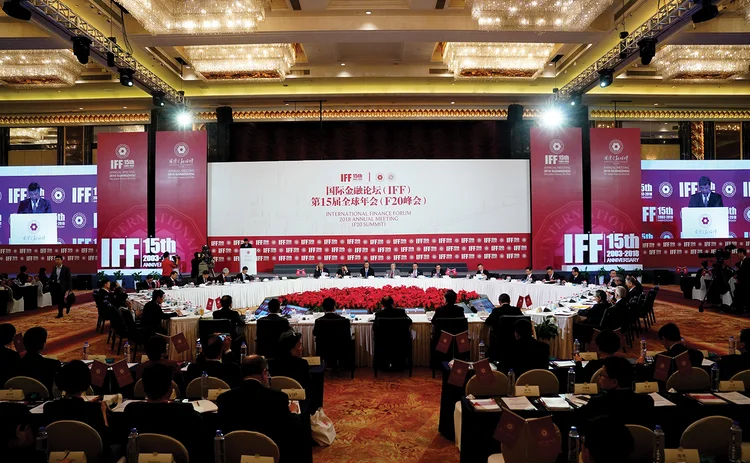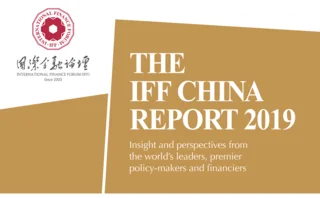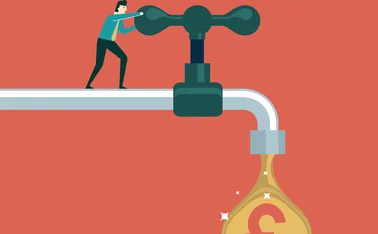
Birth pangs of a new world order


Populism, unilateralism, trade protectionism and anti-
globalisation are resurgent, and economic growth and global development face a new set of challenges in an increasingly risky landscape. Amid the chaos, China and other emerging economies are actively participating in the reform and construction of the global governance system, and China’s efforts in promoting the Belt and Road Initiative (BRI) have received wide attention, approval and participation from the international community.
Crossroads of change
Society must embrace innovation for globalisation to be sustainable; advancements in technology will only be successful if implemented with a view to maximise productivity. While technological advancement has been the biggest driver of globalisation in the past, globalisation itself is now under threat.

Gloria Macapagal Arroyo, former president of the Philippines and now the country’s speaker of the House of Representatives, said that since the establishment of the Bretton Woods system of monetary management led by the US in 1944, globalisation has advanced rapidly and profoundly. This has affected the development pattern of human society, especially since the fall of the Berlin Wall in 1989. However, in the past few years, new anti-globalisation and protectionist sentiments have emerged in the form of “America First” statements from President Donald Trump, and Brexit, the UK’s decision to withdraw from the EU. Some pessimists even think economic globalisation has run its course.
Han Seung‑soo, former prime minister of the Republic of Korea and former president of the UN General Assembly, believes the reason is that although the old idea of globalisation has brought many benefits to human society in economic and non-economic fields, the benefits have been uneven among and within countries. After the 2007–08 global financial crisis, during a period of slow recovery, instability and inequality – both social and economic – increased, leading to the rise of populism and protectionism.
Massimo D’Alema, former prime minister of Italy, reiterated that although globalisation has accelerated global economic growth in the past, it has also increased inequality and the concentration of economic wealth. The enterprises in developed countries moved to places with lower labour costs, resulting in damage to domestic workers’ interests.
Zheng Zhijie, president of the China Development Bank, said international economic strength has evolved in a profound way, and the relative strength of the developed economies that created the traditional rules around globalisation has declined. Emerging and developing countries have comprised 80% of global growth, while only accounting for 40% of the total world economy.Currently, global economic growth faces severe challenges. Christine Lagarde, managing director of the International Monetary Fund (IMF), indicated that the global economy is being threatened by frictions on trade, which has cast doubt on the multilateral trading system.
José Manuel Durão Barroso, former president of the European Commission and former prime minister of Portugual, said we are living in different times. The mechanisms of the past have failed, but the new framework and new order have not yet arrived. We are in a transition stage and need to decide whether to have an open environment or a narrow, closed-off one. This uncertainty has triggered doubts in business and investment circles, and is the greatest risk to global economic growth at present.
Former Chinese vice-minister of finance Zhu Guangyao said the harm unilateralism and protectionism can cause was demonstrated in 2018, when long-established global supply chains came under fire. The open, transparent, inclusive and non-discriminatory multilateral trading system is now facing the threat of indefinite suspension.
Trend towards common development
Shaukat Aziz, former prime minister of Pakistan, said that despite differences in internal goals, all countries should look to co‑operate to stabilise the global economy. The world has become more interdependent, and links between countries increase daily. Human beings must embrace globalisation if they are to prosper. “Only in this way can we ensure more competition, higher productivity and more active motivation for innovation,” he said. “Worldwide, a new type of economic globalisation towards common development is gradually becoming the trend of the times and the common wishes of the people are moving towards it.”
The longer globalisation stalls, the greater the damage. The Republic of Korea’s Han called on world leaders to reverse the retrogression process. Harley Seyedin, special adviser to the chairman at the George H.W. Bush Foundation for US-China Relations, said US enterprises have suffered more than their Chinese counterparts in the trade friction between China and the US, and called for both sides to co-operate and cool tensions rather than expanding trade wars.
Anti-globalisation sentiment is not confined to one country. Barroso said that, although some people in Europe want to halt the process, the continent as a whole does not want to see globalisation stumble. He said it would be a bad decision for Europe to turn inwards and revert to the Cold War-era environment; the world needs a new institutional order. “It is necessary to establish a governance framework acceptable to and abided by all parties,” Barroso said. He also emphasised that all multilateral institutions such as the UN and the World Trade Organization (WTO) should be supported to build infrastructure to continue improving the world’s interconnectedness: “We must work together to achieve sustainable development, and we must not forget to help and support those less developed countries.”
Former governor of the People’s Bank of China Zhou Xiaochuan said that, compared with past globalisation efforts, new players and trends are now involved: the emergence of developing markets; the shift of investment-related savings from Western countries to emerging markets and Asian countries with high savings rates; the flow of information, trade and investment enhanced by technological progress; the gradual improvement of infrastructure and systems; and the joint response to a possible future global financial crisis. The focus of globalisation has changed, which should arguably create new rules and a new global consensus.
Globalisation is fuelled by investment and trade, international co-operation and the exchange of knowledge. Through optimising the allocation of resources among countries and the division of labour and co-operation, benefits can be reaped by all. In particular, low-income developing countries will benefit greatly, making global development more balanced, better and stronger.
A solution for globalisation
Since President Xi Jinping’s proposal of the BRI in 2013, more and more countries and regions have supported and chosen to participate in its construction. China has signed co-operation agreements with more than 140 countries and international organisations, extending the reach of the initiative and creating opportunities for further projects.
Zhou believes the BRI will lead to the formulation of new globalisation rules. It has brought about a change in the scope and focus of globalisation, which will promote the formulation of relevant rules. But the new world order is still in its infancy, and should be strengthened through reform of the WTO and other international bodies.
Aziz said the BRI has set a new standard for global co-operation, which he hopes will be replicated by countries worldwide. Pakistan has already benefited greatly from the BRI with billions of dollars worth of investment. Ashfaque Hasan Khan, former finance minister of Pakistan and a member of Pakistan’s economic advisory committee, related an old Chinese saying that prosperity depends on the prosperity of one’s neighbours.
Arroyo said the BRI provides the hardware for a new type of globalisation and requires infrastructure for world trade and investments to thrive. This new type of globalisation will be more inclusive and will not be dominated by the countries of the West. The BRI can be interpreted as ‘globalisation 2.0’.
Shakirudeen Adewale Oloko, Nigerian consul general in Guangzhou, said the BRI is also aiding development in Africa, offering a solution to tackle the wealth disparity caused by traditional globalisation. D’Alema also said he hoped the BRI will help with inclusivity and shared wealth. The BRI offers an opportunity for attracting investments and encouraging economic growth. However, there is also a concern China may reinforce its position in Europe, gradually shifting the balance of economic and political power in its favour.
Only users who have a paid subscription or are part of a corporate subscription are able to print or copy content.
To access these options, along with all other subscription benefits, please contact info@centralbanking.com or view our subscription options here: subscriptions.centralbanking.com/subscribe
You are currently unable to print this content. Please contact info@centralbanking.com to find out more.
You are currently unable to copy this content. Please contact info@centralbanking.com to find out more.
Copyright Infopro Digital Limited. All rights reserved.
As outlined in our terms and conditions, https://www.infopro-digital.com/terms-and-conditions/subscriptions/ (point 2.4), printing is limited to a single copy.
If you would like to purchase additional rights please email info@centralbanking.com test test test
Copyright Infopro Digital Limited. All rights reserved.
You may share this content using our article tools. As outlined in our terms and conditions, https://www.infopro-digital.com/terms-and-conditions/subscriptions/ (clause 2.4), an Authorised User may only make one copy of the materials for their own personal use. You must also comply with the restrictions in clause 2.5.
If you would like to purchase additional rights please email info@centralbanking.com test test test







